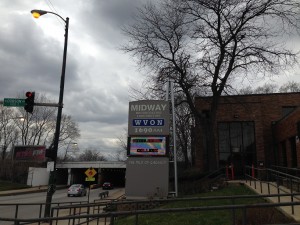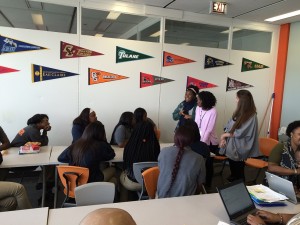 (submitted by Larry Yarbrough)
(submitted by Larry Yarbrough)
Monday began with our bus trip to radio station WVON in the city’s Southside. Founded in 1963 as an AM station (1690) to serve as “The Voice of the Negro,” WVON continues to be “an interactive forum for the African-American community to discuss current, social, economic, and political issues” referring to itself as “The Voice of the Nation” and “The Talk of Chicago.” Most listeners now access WVON through its live-streaming on the internet.
Throughout the morning we met with producers, newsreaders, and talk-show hosts to learn how the station works, observing and meeting with Perry Small in breaks during her 9-12 morning show. Mayor Rahm Emanuel’s appointment of a new police chief for Chicago was among the topics Small and her callers debated. Other segments focused on local and national politics.
Over lunch at the station we met with weekly WVON host Dorothy Wright Tillman, who provided a link to last year’s alternative break trip to Montgomery. Tillman, a native of Montgomery, was among the first marchers to cross the Edmund-Pettus Bridge in Selma on Bloody Sunday. An organizer for the SCLC, she work closely with Martin Luther King, Jr. in the south and then in Chicago, where she has served as an alderman in the Third Ward and political activist on many social justice issues, including public education.
Education was the main theme of the afternoon, focusing on engagement with students, faculty members, and administrators at Butler College Prep, one of seventeen campuses in the Noble network of charter schools scattered throughout the city. Begun with the founding of the Noble Street Charter School in 1999, the network now serves 12,000 students drawn from 70 Chicago communities.
 After touring the facilities with two juniors, we met in small groups with 80 Butler students who are beginning to think and plan for the next steps in their education. Our six Chicago students divided themselves among the groups, joined by other Middlebury students to talk about transition to college and college life. It was not all pitching a line. The conversations dealt with real challenges students from schools like Butler face when attending elite colleges like Middlebury. Butler students had tough questions; our students were impressed—and a little unsettled.
After touring the facilities with two juniors, we met in small groups with 80 Butler students who are beginning to think and plan for the next steps in their education. Our six Chicago students divided themselves among the groups, joined by other Middlebury students to talk about transition to college and college life. It was not all pitching a line. The conversations dealt with real challenges students from schools like Butler face when attending elite colleges like Middlebury. Butler students had tough questions; our students were impressed—and a little unsettled.
When we got back to the hostel where we are staying, our debriefing of the day ended up focusing on the afternoon at Butler and the challenges facing inner-city students and their families. We wrestled with tough questions about how social justice affects educational policies in cities like Chicago, how charter schools like Butler affect other schools in the city’s education system, and how the curriculum of charter schools meets student needs. We also found ourselves wrestling with how well Middlebury meets the needs students from schools like Butler.
For some of the students on our trip the visit to Butler was a chance to witness first hand some of the issues they are engaging in education courses they are taking (or have taken) at Middlebury. For others it was an opportunity to look at the issues for the first time. For all of us it was an experience that brought to life issues that affect all of us—and demand a response.